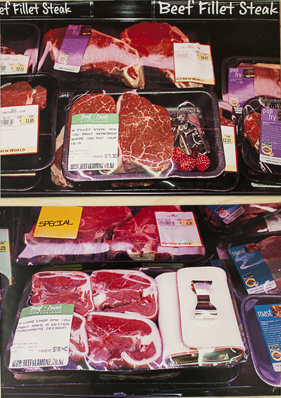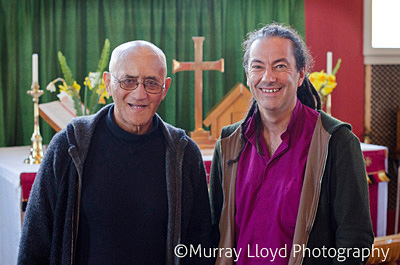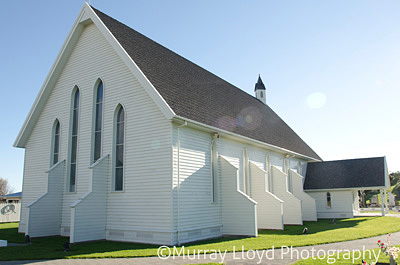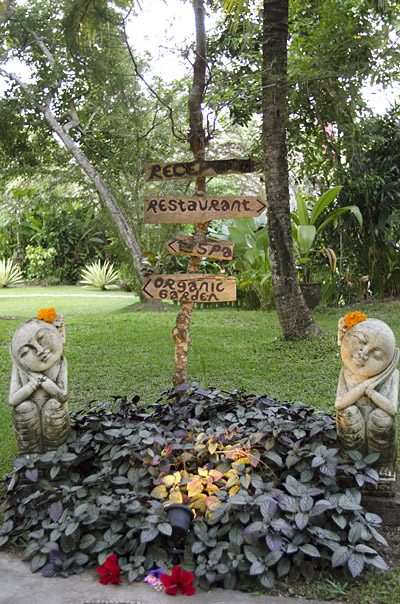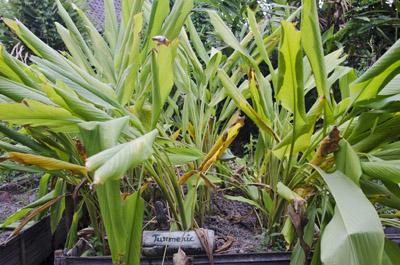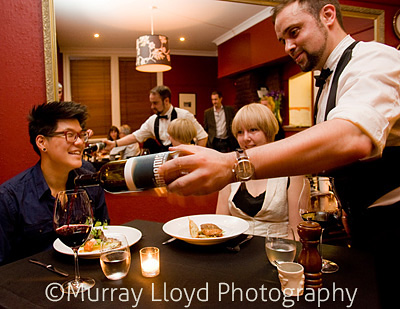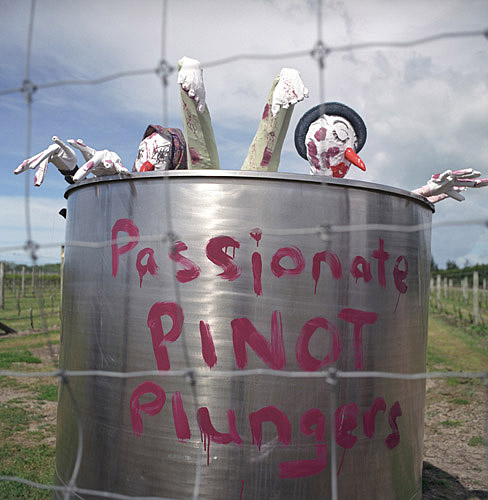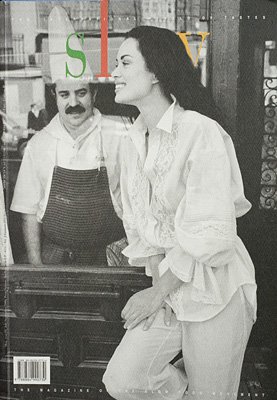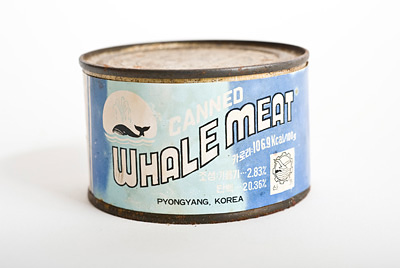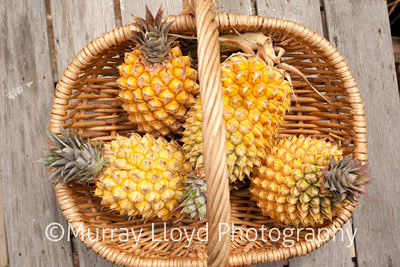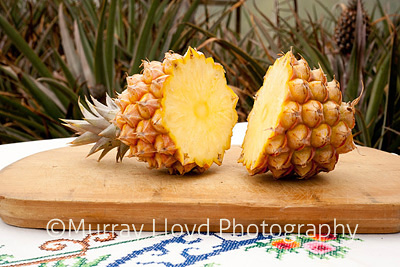I couldn't work out if this was an ironic take on the normal "captured" moment used in camera advertisments (eg Usain Bolt or fast-moving wildlife ) or it just implies New Yorker Magazine readers love organic food. The guy in the ad is a New York photographer who photographs food among other things.
Promoting NZ Beef and Lamb | Murray Lloyd Photography
A graphic design exhibit titled Food for Thought caught my eye at Massey’s Exposure exhibition in Wellington. Created by Grga Calic, the posters were a refreshing take on the existing campaign which uses Olympic sports women from New Zealand to encourage young women to eat more red meat. He says the campaign aims at putting glamour back into red meat and focusing on the physiological rather than the physical – brains over brawn.
Although aimed at young women I am sure a wider demographic can identify with improved decision-making and not losing the car keys
The Exposure (now called Blow) exhibition is well worth looking around and is on each year in November . These images have been published with permission from Grga Calic and he can be contacted on 027 3084320 or at grga_nz@yahoo.com
Boutique dairy milking in NZ | Murray Lloyd Photography
My image of life as a dairy cow reached new highs when I first sighted this delightful milking shed bathed in the early morning light. Owned by an American couple who left the US when George Bush was elected in 2000, the milking operation near Dunedin numbers between 16 and 20 cows.
With a backdrop of faded washing hanging from the roof of the milking shed, a yodel-like call brought the cows running. Once inside the milking shed each cow knew exactly which bay to head for. One cow, who left the property for two years, still remembers which bay was originally hers.
The cows are milked using a bucket system. Before the milk is taken from the cow each one receives individual grooming (to remove muddy patches) and the udders are hand washed with a cleansing solution.
The milk – straight from the cow - has less than 10% of the maximum allowed limit of bacteria found in milk (pasteurised and homogenised) sitting in your supermarket fridges.
With National Radio broadcasting, and a breakfast of local Harraway oats mixed and sweetly scented lucerne the cows looked very contented. As did the customers who could take away milk, cream, ghee, cottage cheese, quark or even a mango flavoured lassi.
If it weren't for your gumboots | Murray Lloyd Photography
Alice in Bakingland cookbook | Murray Lloyd Photography
After bringing armfuls of fresh baking home over the last couple of months, I will miss Alice and her kitchen. Alice has been fantastic to work with and her generosity showed no bounds. This was typified when on the last day of food photography she offered me a cake to take home. Aptly named Celebration Cake, Alice was celebrated when the cake was presented at a friend's house and held pride of place amongst fish and chips, burgers and a few beers.
Although the styling here differs from the more refined book version, the inside remained the same - three layers of chocolate cake. For those who like to bake, look out for the book in the middle of next year.
Star Wars at Cooking School in NZ | Murray Lloyd Photography
Photographing for Hospitality Magazine at the Cordon Bleu cooking school (now officially opened in Wellington), I could not help noticing these two machines hiding in the corner. Does anyone else see resemblances with a couple of famous Star Wars characters?
Ruth Pretty's Cheese Roll Recipe | Murray Lloyd Photography
I have even noticed a few much neglected asparagus spears popping up in our garden. However you will need more than a few spears to make the Toasted Asparagus and Swiss Cheese roll recipe from Ruth Pretty's latest book.
Ruth's book was a great project to work on as the food images were complemented by editorial photography, landscapes and photos of garden produce.
Ruth's recipe is a healthy version of the famous Dunedin cheese roll.
FairTradeBananas vs EthicalChoice | Murray Lloyd Photography
I was surprised to see All Good Organics Fair Trade Bananas right at the entrance of one of my grocery suppliers recently.
I thought the move may have resulted from the stoush between the owners of the Fair Trade bananas – New Zealand’s All Good Bananas, and Dole’s Ethical Choice brand. However Chris, the fresh produce manager at the supermarket, said the move was because of a special they were running. Either way it was good to see they sold a lot more Fair Trade bananas from the new location.
To avoid any confusion this is the All Good Bananas Fair Trade brand
I wonder if they are using Fair Trade bananas on Sesame Street
A Royal Afternnoon Tea at WOAP | Murray Lloyd Photography
A Church, and particularly a Maori church, seemed a very appropriate place to commemorate Mrs Royal, an Otaki Caterer of yesteryear. At the Wellington on a Plate event hosted by Ruth Pretty Catering and Rangiatea Church, her kindness was noted, with special mention of the Maori families she used to help by selling goods from her bakery at below cost.
The guests who travelled to Otaki for the event not only got fed by an afternnon tea inspired by Mrs Royal but were also welcomed to Rangiatea Church. Andre Baker gave a compelling talk about the history of the church including minute details about the rebuild after the church was burnt down in 1995 by arson (he was one of the key project managers). It is seldom I hear someone talk with such humbleness and depth of knowledge.
Louise Carkeek (who had just turned 90) was also introduced to the audience. She along with Marie Hakaraia was instrumental in renewing the embroided kneeler cushions that were destroyed in the fire. We were told they got bored with the delays in the rebuild and just got on with it. Sixty three cushions were destroyed but there were at least twice as many replacements on display.
1953 was the year Ruth Pretty selected to recreate Mrs Royal's time and once the guests entered the church hall they were greeted by food and royalty (it was the year the Queen was coronated). Even with the two Bishops available there was some confusion (and amusement) about who was going to say Grace. I am sure Mrs Royal would have would have been both thrilled and humbled by this tribute.
Food Photography : 2 good things | Murray Lloyd Photography
Not having to do the dishes...
...and having a chocolate brioche for breakfast. Thanks to Alice.
The Best Coffee in Wellington | Murray Lloyd Photography
At home I have put many beans through the grinder, into the stovetop and drunk usually as a long black with flat milk (I am drinking one as I write this). I have had several bean favourites but these were blown away when I tried the Italia blend from Tony Gibbs recently.
Although his tiny café on the Terrace has been operating since 2001 it has been unnoticed up until now. Maybe this is because the sign overhead remains blank and the café doesn't even have a name.
The lack of a sign was no hindrance to the flow of people coming in and out of the cafe while I was photographing, most of them exchanging greetings with Gibbs while he roasted beans. The beans are roasted in a fully restored Aug Olsen originating in Denmark.
Gibbs has been roasting beans since 1987 when he was trained by George Kepper, an Australian based Russian who consulted several of the big roast companies in Sydney from time to time to correct blends and adjust roasts that were not quite right. The Italia blend was perfected by Gibbs on visits to Kepper in Sydney and has not been altered since 1987.
Of the beans Gibbs purchases for his café he rates the Columbian Medellin Supremo as the best (and the most expensive), supplied by John Burton, New Zealand’s primary importer of beans for smaller roasters.
Gibbs’s blends, aside from the Italia include TG Pearl, Indian Mysore (named after the Southern Indian province where it comes from) and Brazilian which is made especially for the drinkers at Taste Café in Kelburn, one of two cafes Gibbs supplies (the other is Salvation in Newtown).
Located in Wellington’s corporate heartland (the PM drops in for coffee and the Treasury is right opposite) it is great to see someone putting taste firmly on the bottom line.
Stop Press: The cafe has been renamed Old George (after the Russian who taught Tony Gibbs how to roast the beans) and is still producing the best coffee in Wellington
The Good Oil on Bali | Murray Lloyd Photography
“Please bring organic olive oil and flour if possible…” Having booked numerous accommodation suppliers over the years, I was impressed by this unique approach from Swasti Eco Cottages in Bali. After leaving Common Sense Organics with the Bali bound bottle of Moutere Grove Organic Olive Oil I looked forward to handing it over to the Swasti kitchen once we got to Ubud.
Arriving at Swasti we quickly made a tour of the organic garden. The range of produce included turmeric, mulberries, egg plants, tomatoes and some Avatar lookalike goats.
After a couple of days exploring the wonderful Ubud surrounds I finally got to photograph Pa Putra (one of the Swasti kitchen staff) holding the Moutere Grove oil in the dining room. In return for the organic oil we received two free desserts.
Other highlights were the squirrels darting around the treetops, the frangipani flowers draped around our room, frogs croaking through the night, very friendly staff and the abundance of fresh produce on which we dined.
However it will have to be the next visit for the 3 in 1 chocolate massage, black rice icecream or a special drink of organic raw cacao, banana and cashew milk.
Although it was left behind the Moutere Grove Organic olive oil will feel right at home.
Restaurant Food Photography | Murray Lloyd Photography
Ambeli Restaurant rated highly in the restaurant scene in Wellington ( it has now closed) and I was hoping to translate this standard into a photograph for the Entertainment Book.
Wanting the mirror reflection in the image, Shaebodine Moleta (Ambeli’s owner) showed no hesitation when asked to ‘adjust' the table’s height to achieve this. I was impressed. The image was meant to show just the couple enjoying themselves but this photo (the test exposure) ended up with Moleta perfectly placed pouring wine. I love being able to capture a documentary image from what was meant to be a posed setting.
Scarecrow creativity | Murray Lloyd Photography
Slow Magazine | Magnum Photos | Murray Lloyd Photography
Slow, the food magazine published by the Slow Food Movement from 1998 through to 2007 is the most fabulous magazine I have ever laid my hands on.
It has a most tactile feel (pages are Bioprima Book Paper), the covers (Fabria card from the Miliani Fabriano Mills) are beautifully designed and the use of photography is extraordinary.
It is the only time I have seen elephant hunting in colour paired up with black and white photographs of breast-feeding mothers. To top that off the magazine is full of Magnum photography from practitioners as diverse as Henri Cartier Bresson, Chris Steel Perkins and Gueorgui Pinkhassov. If you can track a copy down great – I have been lucky to have loaned a few copies from a friend.
The Elephant hunting story is illustrated with photos by Magnum photographers Martine Franck, Dennis Stock and also by Eugene Richards a past member of Magnum. Issue No. 46 has a funny photograph by Magnum photographer Chein Chi Chang and another amusing photo by Ferdinando Scianna of a bar scene in Miami, Florida. On a more sombre note issue No. 50 has a striking image taken at the Tokyo Fish Market by Bruno Barbey.
The magazine may have ceased but at least the Slow Food Movement is still going.
Mad Hatters Tea Party in Wool | Murray Lloyd Photography
The inedible food at the Mad Hatter’s Tea Party seemed very un-birthday partyish but after being served free tea and Kiwiana themed biscuits the mood became more festive. Although surrounded by tea cosies rather than mad hats this exhibition at the Kapiti Art Gallery resonated well with events on the other side of the world.
Whale meat in New Zealand | Murray Lloyd Photography
The can of whale meat pulled from sale on Trade Me recently (thanks to Project Jonah) reminded me of a can rusting away in our house. This can arrived in New Zealand in 1989 originating from North Korea . It was brought into the country by a couple of young adventurers returning from a trip sponsored by New Zealand’s communist community. In 1989 the law in New Zealand stated you could not import any raw whale products so I guess the customs officials turned a blind eye to the cooked contents from North Korea. Changed in 1999, the law now prohibits the import of all whale products including the contents of this can.
A Taniwha, a Ghost and the Scream| Murray Lloyd Photography
If you want to get your hands on the real Scream you will have to spend more than 140 Million NZ Dollars, its last sale price. So here’s to the imperfections of the world, home grown produce, and heritage crops which can be very satisfying at a fraction of the cost.
The Taniwha
The Best Tasting Pineapple in NZ | Murray Lloyd Photography
Expect the unexpected is what the tourists are told when coming to New Zealand and that is just what I got when visiting my brother in the Far North this summer. The talk had turned to a couple growing pineapple just a couple of kilometres down their dusty inland road.
With a quick phone call and a short drive, I was shown around the home of Jan Tagart and Steve Cottis, and close to one thousand pineapple plants.
After spending a sweltering hour and a half in two large tunnel houses photographing Jan, Steve, plants and the pineapple I was invited to taste a piece of the exotic fruit.
As the tropical flavours enveloped my taste buds I realised I had never really tasted pineapple before. The underwhelming supermarket supply in New Zealand had put me off what was a taste sensation.
Sold only at the Bay of Islands Farmers Market in Kerikeri at prices between five and twelve dollars the Tagert and Cottis stand gets plenty of repeat customers including one who was reminded of “pineapple grown in the Islands”.
It all started with two plants given to Jan by her chiropractor in Mangonui (home of the famous fish and chip shop) and another nine from a greenhouse in Kerikeri. Jan and Steve now have enough plants to supply their local market with fruit most of the year.
Back in Wellington Pina colada will never be the same.
Organic Kerikeri Citrus | Murray Lloyd Photography
Looking for an organic producer to photograph on a recent trip to Northland my sister- in law put me onto “Mr Organic” who put me on to Okura Plantation.Okura plantation, an organic citrus orchard in Kerikeri, has been in the family of Mike and Pat Collins since 1954 and has been organic since 1987. To give you some idea of the history of organic farming in New Zealand, Okura plantation’s Biogro certification number is eighty one. If you were to register a new organic operation with Biogro in New Zealand today your number would be in four figures.
Originally three times the size, the orchard has been scaled back to the present size of ten acres. The plantation has crops of navel and Harward Late (Valencia) oranges, Satsuma and Encore mandarins, limes and a recently planted row of Seville oranges. Valencia oranges although named after the Spanish city, are actually a hybridised orange originating in California.
Let loose in the orchard by Mike, the weather gods were on my side providing beautiful soft light for the table top photography and sunlight for the landscapes.
Most of the organic citrus from Okura heads to Auckland for distribution but while I was at the orchard Mike was expecting pickers to take some of his oranges to the local farmers market in Kerikeri. I was surprised when he told me later his oranges had been usurped by some late ripening oranges arriving from Gisborne …six hundred kilometres away.






